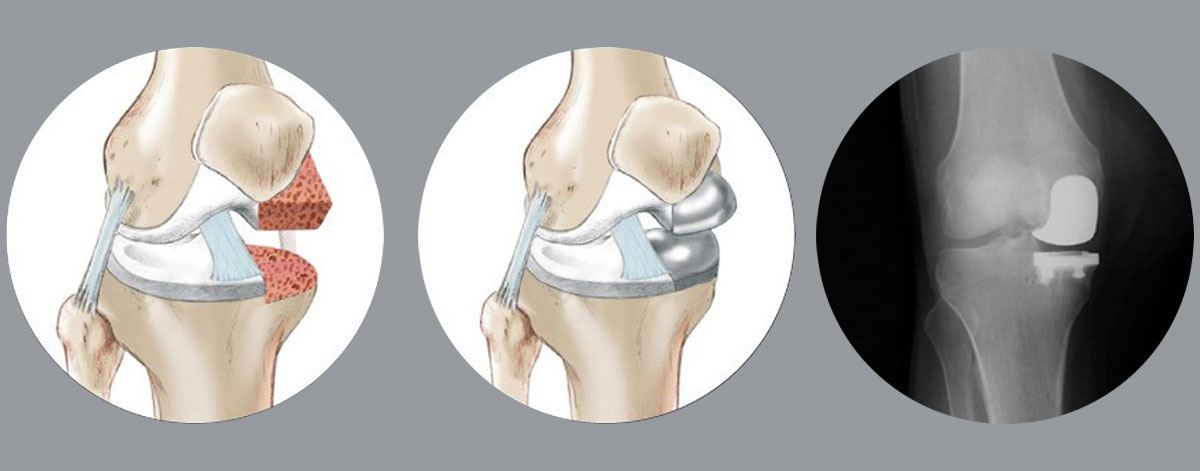Unicompartmental Knee Replacement
Unicompartmental knee replacement, also known as partial knee replacement or unicompartmental knee arthroplasty, is a surgical procedure in which only one of the three compartments of the knee joint is replaced with an artificial prosthesis. This procedure is an option for patients who have arthritis or damage that is limited to a single compartment of the knee, typically the medial compartment (inside part) or the lateral compartment (outside part) of the knee.
Unlike total knee replacement, which involves replacing the entire knee joint, unicompartmental knee replacement is a more conservative approach that preserves healthy bone, ligaments, and cartilage in the unaffected parts of the knee. It is generally reserved for patients who meet specific criteria, including having intact ligaments, good range of motion, and limited knee arthritis.
The advantages of unicompartmental knee replacement compared to total knee replacement include:
- Smaller Incision: The surgical incision is smaller, leading to potentially less post-operative pain and a faster recovery time.
- Preservation of Healthy Tissue: Unicompartmental knee replacement preserves more healthy bone and soft tissues, which may be beneficial for younger or more active patients who may need revision surgery in the future.
- Quicker Recovery: Since the surgery is less invasive, patients often experience a quicker recovery and rehabilitation period.
However, not all patients are suitable candidates for unicompartmental knee replacement. Some limitations and considerations include:
- Extensive Arthritis: If arthritis or damage affects more than one compartment of the knee, a total knee replacement may be more appropriate.
- Ligament Damage: Unicompartmental knee replacement relies on intact ligaments for stability. If the ligaments are damaged or deficient, total knee replacement may be necessary.
- Surgeon Experience: The success of the surgery depends on the surgeon's experience and expertise in performing unicompartmental knee replacements.
- Risk of Revision: Unicompartmental knee replacement may have a higher risk of requiring revision surgery compared to total knee replacement, especially if arthritis progresses in other compartments over time.
Do's for Unicompartmental Knee Replacement
- Follow Pre-operative Instructions: Adhere to your surgeon's pre-operative instructions, which may include fasting guidelines and medication restrictions.
- Prepare Your Home: Ensure your home is set up for a safe recovery, with clear pathways and necessary aids like a walker or crutches.
- Follow Physical Therapy: Engage in physical therapy before and after surgery to strengthen your knee and improve its mobility.
- Keep the Incision Clean: Keep the surgical incision clean and dry to avoid infection. Follow your surgeon's advice on how to care for the wound.
- Control Swelling and Pain: Use prescribed medications and ice packs to control swelling and pain as recommended by your doctor.
- Perform Recommended Exercises: Continue doing the exercises recommended by your physical therapist to regain strength and flexibility in your knee.
Don'ts for Unicompartmental Knee Replacement
- Ignore Red Flags: If you experience severe pain, fever, or signs of infection around the incision, contact your surgeon immediately.
- Overexert Yourself: Avoid overexerting your knee during the early stages of recovery. Follow your physical therapist's guidelines and do not rush the process.
- Neglect Physical Therapy: Skipping or neglecting physical therapy sessions can hinder your recovery and may lead to complications.
- Put Weight on Your Knee too Soon: Refrain from putting weight on your operated knee until your surgeon or physical therapist permits it.
- Ignore Medication Instructions: Follow your prescribed medication schedule diligently to manage pain and inflammation effectively.
- Engage in High-Impact Activities: Avoid activities like running or jumping, which can put excessive stress on the knee joint.
- Sit for Prolonged Periods: Avoid sitting or lying in one position for extended periods, as it can lead to stiffness and discomfort.

